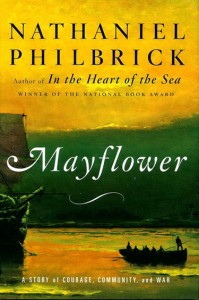Mayflower: A Story of Courage, Community, and War
 Mayflower gives us a lot to think about. Maybe it’s because its author, Nathaniel Philbrick, recognized the need to dig deeper into the story of the Pilgrims — deeper than the familiar myths. “I thought I knew about the voyage of the Mayflower,” he explains.
Mayflower gives us a lot to think about. Maybe it’s because its author, Nathaniel Philbrick, recognized the need to dig deeper into the story of the Pilgrims — deeper than the familiar myths. “I thought I knew about the voyage of the Mayflower,” he explains.
But when I started to explore what happened when an old, leaky ship arrived off the coast of New England in the fall of 1620, I soon realized that I, along with most Americans, knew nothing at all about the real people with whom the story of our country begins.
Mayflower is an account of the Pilgrims of Plymouth Colony. It begins with their first experiences on the wild, barren coast as they work to establish a relationship with their native neighbors, and extends through the turmoil of King Philip’s War in the next generation.
This is not historical fiction, but history — well-researched, full of authentic detail, and compellingly narrated. Perhaps my history classes somewhere along the line included some of this material, but if so I don’t remember it. Philbrick’s account encourages a level of reflection that will make it hard, now, to forget. An even-handed but painfully honest look at the earliest years of what eventually became the United States, Mayflower takes up themes that we continue to struggle with: living together, being consistent with the ideals we profess, working to pass on to our children and grandchildren a sense of our values and the cost of preserving them.
In one passage, Philbrick recounts the Pilgrims’ journey to visit the Pokanoket tribe, whose leader, Massassoit, had pledged his assistance to the struggling Englishmen. As they travel they notice various holes bored into the ground beside the trail — memory holes, as it turns out. The holes signify sites where important events occurred, or important people died. The Indians would stop and recite the story of each hole, making the journey more interesting and, as Philbrick explains, helping the Pilgrims to recognize that “they were traversing a mythic land, where a sense of community extended far into the distant past.” We live in that same land, and it is still rich with myths. Mayflower excavates some of them with respect, truthfulness, and at times deep regret.



4 Comments
Amy @ Hope Is the Word
This sounds very interesting, Janet. I wonder if this is the same author who writes juvenile and ya fiction.
Janet
I’m not sure… I know he has some “young reader” adaptations of his books for adults, though.
Barbara H.
That sounds fascinating.
JW
Thanks for reading this ahead of me. It is still on my pile. But having read his work about the Essex, I figured he would do justice to this topic as well. I want to also read his book about Custer and the last stand.
As for him writing children’s books – you are probably thinking of Rodman Philbrick who wrote the Homer P. Figg story. http://www.amazon.com/Mostly-True-Adventures-Homer-Figg/dp/0439668212/ I believe these authors are brothers.